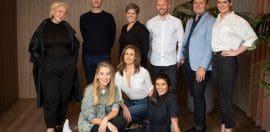AirRobe signs partnership with The Iconic to help drive circular fashion

20 October 2021 at 3:57 pm
The fashion industry is the second most polluting industry in the world, now two Aussie businesses have come together to do something about it.
With the rise of fast, cheap fashion comes the sobering statistic that a garbage truck’s worth of clothing is thrown away every second, globally.
This sheer amount of waste was something Hannon Comazzetto witnessed first-hand during a corporate career consulting with large fashion houses. Shocked by what she saw, Comazzetto believed something had to change, so she quit her job and started working on a solution.
For her, the solution lay in the circular fashion industry. Being able to list, rent and buy preloved items isn’t a new concept – eBay is successful in the space, as is the French luxury-goods reseller Vestiaire Collective, and Gen Z’s favourite Depop.
The industry is also worth billions.
A report by sustainable fashion site Thredup states that the resale market (which is the largest segment of the circular fashion industry) is currently worth US$37 billion (AS$49 billion), and is on track to reach US$77 billion (AS$103 billion)by 2025. Notably, the resale market is growing at 11 times the rate of the broader retail industry.
Recognising this thriving resale sector, in 2019 Comazzetto founded AirRobe, an online marketplace where users can buy, sell and lease high-end secondhand clothing and accessories.
AirRobe operates in the same way as other resale sites, in that users open an account (their personal AirRobe) and use it to list, rent and buy preloved items.
After raising $1.28 million in seed funding in 2020, Comazzetto set out to further develop the offering. This latest partnership with The Iconic is part of the bigger strategy.
The partnership means customers buying something from The Iconic can choose to automatically add their new purchase to their personal AirRobe with one-click at checkout. It even gives them the resale value of their item.
If they choose to “add to AirRobe” all product information is auto-captured, including imagery. When the customer is ready to resell, rent or recycle the item all they have to do is click “list” and the item goes live on their AirRobe marketplace. You can see it in action, here.
Getting The Iconic on board
Comazzetto told Pro Bono News that when she approached the team at The Iconic at the start of the year about the possibility of them launching into the circular economy they were instantly receptive.
After initial meetings with The Iconic went well, Comazzetto, who is originally from Australia but currently based in San Francisco, flew into Sydney to meet with the company’s CEO, Erica Berchtold.
“She saw it as a really interesting idea, and something their customers would love to use,” Comazzetto told Pro Bono News.
“They moved quickly in prioritising the project and we worked together to get it live on their site. It’s been great to see The Iconic take a chance on doing something innovative with a start-up like us.”
Berchtold said that the partnership provided their customers with a way to shop more responsibly.
“This milestone brings us one step closer to addressing industry-wide sustainability challenges,” she said.
While The Iconic isn’t the first brand to partner with AirRobe, it’s the brand Comazzetto and her team wanted to help bring their solution to the mainstream market.
“The fashion brands we’d previously partnered with already had a big focus on sustainable and timeless pieces. Brands like Elocin, MLM The Label, and Duffle & Co,” Comazzetto said.
“The Iconic was a great partner for us because they have a large reach with Australian customers.”
Comazzetto’s goal for AirRobe is to provide more people with access to the circular economy and to encourage consumers to see reselling, renting and recycling as viable and easy options to keep their clothes out of landfill.
“Fashion is the second most polluting industry globally and a space that has been plagued for a long time by ethical and environmental issues,” she said.
“These are issues we are all waking up to. People want change, which is what’s driving the huge demand in pre-loved fashion.”
Since launching in 2019, Comazzetto says she’s starting to see a real change in not only how consumers approach the concept of circular fashion but traditional retailers, too.
“The conversations happening now are about how retailers should get involved – they know the data and understand the huge trend from their customers towards more sustainable models of consumption,” she said.
“They are looking for ways to implement those models and contribute to solutions rather than being part of the problem.”







